

The program adopts a "1+1+1"talent training model: in the first year, students study theoretical courses at the Beijing-based university, then go to Quzhou for agricultural practice.
"After the first year of study in China, students will acquire advanced agricultural knowledge and production technology, learn how to interact with farmers, and gradually grow through close collaboration with them," Jiao said.
In the second year, they return to Africa to provide solutions for small-scale farmers based on their studies in China.
In the third year, they return to China to complete their research and thesis, based on their practical work in both China and Africa.
"This training model not only enhances students' overall capabilities but also promotes the application of agricultural technologies, contributing to agricultural development," Jiao said.
CAU and Malawi University of Science and Technology signed an agreement in Beijing during the 2024 Summit of the Forum on China-Africa Cooperation on Sept 5, to jointly establish an Africa center for the STB program.
"We will cooperate to create a demonstration area in Africa for high agricultural yields and efficient resource utilization, bringing our experience in Quzhou to more African countries," Jiao said.